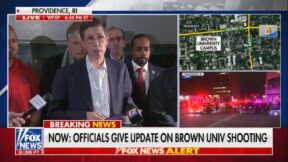‘Your Name Is Not Donald Trump!’ CNN Anchor Jump on Scott Jennings Over ‘Fake’ Jobs Gripe
CNN anchor Abby Phillip jumped all over GOP analyst Scott Jennings for claiming President Donald Trump is right that BLS jobs numbers are “fake,” calling his claim “crazy” and deriding him for parroting Trump.
Trump fired Bureau of Labor Statistics Commissioner Dr. Erika McEntarfer earlier this month after disastrous revisions to the last several jobs reports, then trotted out his own set of pro-Trump data and announced the appointment of The Heritage Foundation’s pro-MAGA E.J. Antoni to the post.
On Wednesday’s edition of CNN NewsNight, Phillip discussed the issue with a panel comprised of Scott Jennings, Jillian Michaels, Rep. Ritchie Torres (D-NY), Julie Roginsky, and Elie Honig.
When Jenning agreed with Trump the numbers were “fake,” Phillip spent several minutes deriding him before sarcastically thankimg him for a “revision” to his statement:
PHILLIP: Another aspect of this is, you know, it — there’s Trump’s rhetoric, which of course is what we just played. But now he’s in a position to actually appoint people who give him the numbers that he does want. I think that’s kind of where the rubber meets the road for the country right now.
It was on the 2020 election. He only wanted people around him who would continue to lie to him about whether he won or lost. He– when it comes to the job numbers, when it comes to crime statistics, he wants to put people in there that double down on his beliefs. And so, at what point, Scott, does that make everything suspect that Trump touches?
(CROSSTALK)
JENNINGS: As it relates to the BLS, by definition, he’s right. The numbers we do get every month are fake because the methodology is so warped that they get changed later. So, so, they’re fake.
(CROSSTALK)
UNKNOWN: But that’s exactly —
PHILLIP: Scott — hold on a second. Hold on.
(CROSSTALK)
JENNINGS: Because they get changed later. So, today’s numbers —
TORRES: I don’t remember you saying that back in April. I don’t —
(CROSSTALK)
UNKNOWN: That’s the point.
(CROSSTALK) PHILLIP: That’s a crazy thing to say.
(CROSSTALK)
JENNINGS: Every month they get changed.
(CROSSTALK)
TORRES: You did not say that back in April when Trump was praising these numbers.
(CROSSTALK)
PHILLIP: Scott, that is an insane thing to say because you —
(CROSSTALK)
JENNINGS: Did the numbers change or not?
PHILLIP: Hold on, Scott. You worked in —
(CROSSTALK)
PHILLIP: You worked in the Bush administration.
(CROSSTALK)
PHILLIP: Hold on a second, Julie. Scott, you worked in the Bush administration. The numbers that the BLS put out, which get revised every single month in the Bush administration, were those fake?
JENNINGS: Well, I think the methodology back then worked better. I think it doesn’t work very well now.
PHILLIP: Okay.
JENNINGS: And so my point is this. Whether you —
(CROSSTALK)
PHILLIP: Hold on.
(CROSSTALK)
JENNINGS: — agree with the word fake or not, they’re not accurate.
PHILLIP: You just made the claim that the fact that the numbers get revised mean that they’re fake.
JENNINGS: Yeah.
PHILLIP: Were they fake when you worked in the government?
JENNINGS: Back in those days, I don’t think the revisions were as substantial. Today, they’re quite substantial.
(CROSSTALK)
PHILLIP: But there have always been revisions.
JENNINGS: I don’t think they were as substantial as they are now.
PHILLIP: Scott, there have always been revisions.
JENNINGS: I don’t think they’re as substantial as they are now.
PHILLIP: The revisions vary. Sometimes they’re small. Sometimes they’re —
(CROSSTALK)
JENNINGS: Are you okay with the level of revisions?
PHILLIP: Guess what?
JENNINGS: They’re pretty off.
PHILLIP: When you actually look at the public data, the revisions in the public data are actually way smaller than the revisions in the private data.
JENNINGS: Here’s – here’s what I think.
(CROSSTALK)
PHILLIP: So, even though the Bureau of Labor Statistics transparently goes back and says we have more information, here’s what we know, you’re making a political claim and I know why you’re doing it. But it’s —
(CROSSTALK)
JENNINGS: No, I’m not making a political claim. I’m making a factual claim.
(CROSSTALK)
PHILLIP: — also one that I think is incredibly — but it’s very corrosive, I think, to the idea of whether or not there is — there’s anything real in the world, right?
(CROSSTALK)
PHILLIP: Just because there are corrections doesn’t mean that it’s fake.
JENNINGS: It’s not.
PHILLIP: Just because
We’re not in disagreement there are corrections, doesn’t mean —
(CROSSTALK) JENNINGS: We’re not in disagreement.
PHILLIP: We are in disagreement. You just called it all fake.
(CROSSTALK)
JENNINGS: I’m saying that every month this agency gives you a number and you can bet that the number is wrong.
PHILLIP: And you said that because —
JENNINGS: Which by definition makes it fake. Now —
(CROSSTALK)
PHILLIP: You said —
TORRES: It is an estimate. It’s not fake.
JENNINGS: So, so my point —
(CROSSTALK)
PHILLIP: Scott, okay.
(CROSSTALK)
JENNINGS: — as it was last night is this. The goal of this agency and the next administrator and of this administration ought to be to update and modernize the methodology so that the numbers we get each month are far more accurate.
PHILLIP: So, when they update the methodology and they continue to revise them because they have more information, which will happen, you’re going to continue to call those numbers fake, I presume.
(CROSSTALK)
TORRES: What exactly is the issue with the methodology?
(CROSSTALK)
JENNINGS: Well, there is a belief that they’re not able to do as much or as accurate data collection from private sector companies right now. They’re not getting the response rates. Therefore, they’re not —
(CROSSTALK)
TORRES: That was an issue back in April. And I don’t remember these objections back in April —
(CROSSTALK)
PHILLIP: Yeah. TORRES: – when Trump was praising these numbers.
(CROSSTALK)
JENNINGS: Well, of course, of course, when he gets the numbers and they look good —
(CROSSTALK)
TORRES: Again —
JENNINGS: — it’s going to look good.
(CROSSTALK)
JENNINGS: But it’s probably highly agitating to find out later that you were handed fake numbers.
TORRES: If there were a vast —
(CROSSTALK)
PHILLIP: Scott, I think it’s — listen. I — it’s —
(CROSSTALK)
MICHAELS: But this is a vast —
(CROSSTALK)
TORRES: If the Bureau of Labor —
PHILLIP: It is silly to continue — I get the politics of it — but it is silly to continue to call —
(CROSSTALK)
JENNINGS: It’s not political.
(CROSSTALK)
PHILLIP: — things that you don’t like fake.
(CROSSTALK)
JENNINGS: It’s not that I like it or I don’t like it. I just like it to be more accurate.
PHILLIP: Your name is — your name is not Donald Trump.
(CROSSTALK)
JENNINGS: I just want it to be accurate. You don’t want accurate data?
(CROSSTALK) PHILLIP: But you have the ability to approach this in a way that is not needlessly inflammatory.
JENNINGS: Yeah, so do you.
PHILLIP: It is not fake, okay?
JENNINGS: Abby —
(CROSSTALK)
JENNINGS: Are the numbers — are the numbers that you’re —
(CROSSTALK)
PHILLIP: It is not fake.
(CROSSTALK)
PHILLIP: When presidents get bad job numbers, like Barack Obama did, when they get bad inflation numbers like Joe Biden did, they easily could have called it fake because they don’t like the numbers. But it’s a choice to do that. And it’s a choice to say that revisions mean something that is —
(CROSSTALK)
JENNINGS: I don’t know why we’re having a combative conversation. My point is the numbers we get at this moment in time seem to be less accurate than ever.
MICHAELS: Yes.
JENNINGS: If the government updates —
(CROSSTALK)
MICHAELS: They are roughly 300 percent —
(CROSSTALK)
JENNINGS: — and does a better job of methodology and data collection, then there’ll be more accuracy. What is wrong with it?
(CROSSTALK)
PHILLIP: I appreciate your revision of your comments.
(CROSSTALK)
JENNINGS: I just literally said the same thing.
PHILLIP: Because what you just said is a fair thing to say.
(CROSSTALK)
JENNINGS: It’s been my point for two nights in row.
(CROSSTALK)
PHILLIP: It is a rational, reasonable thing to say. And you did not use the word faked in that last part that you just said. So I just want to note, that is a revision and I appreciate you doing it. Thank you, Scott Jennings.
Watch above via CNN NewsNight.




